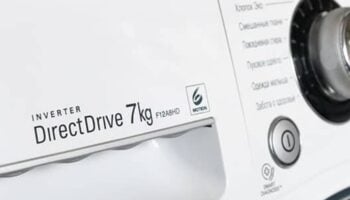We've independently reviewed this article to make sure it's as accurate as we can make it.
To find out more about our article creation and review process, check out our editorial guidelines.
Stuck trying to understand the differences between top-load vs front-load washers?
You’re not alone! Choosing between these types of washers can be a bit tricky.
But don’t worry. I’m here to help!
Top-load washers are more affordable upfront, offer easy access, and allow for adding laundry mid-cycle. On the other hand, front-load washers provide better cleaning performance and use less water and energy; however, they can be more expensive initially.
Read on to choose between a top-load vs a front-load washer!
Comparing Top Load Washers vs Front Load Washers
In this section, I’ll guide you through the critical differences between top-load and front-load washers and how they stack up in performance, efficiency, and convenience.
Are you ready? Let’s dive in!
#1 Design
The main difference between top-load vs front-load washing machines is their design.
Top-load washing machines are the more conventional type of washers, featuring a vertical drum that allows you to load clothes through a door on the top. The drum’s agitation and movement work together to clean your garments during the wash cycle.
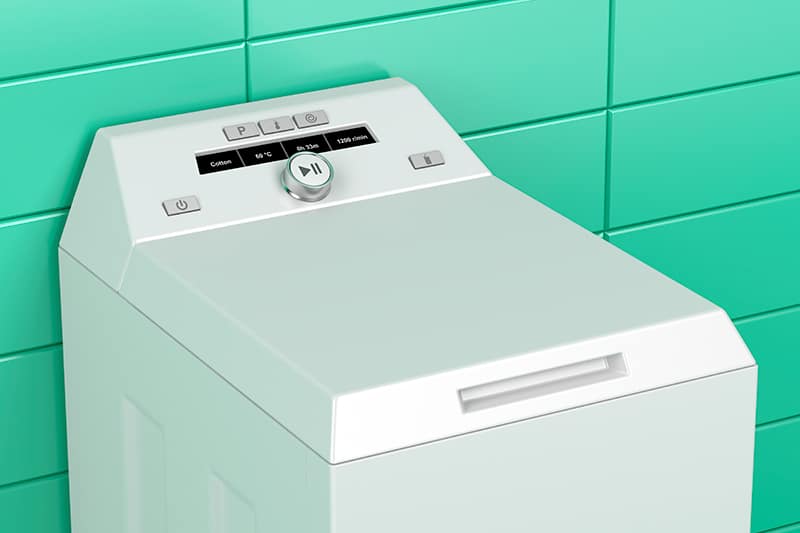
On the other hand, front-load washing machines offer a more modern design with a horizontal drum and front-opening door. However, they require bending down to load and unload clothes, which can be difficult for some homeowners (unless you have a pedestal that raises it off the ground), particularly older people or those with mobility issues.
Adding clothes mid-cycle can also be challenging with front-load washers, as opening the door during a cycle can cause water to spill.
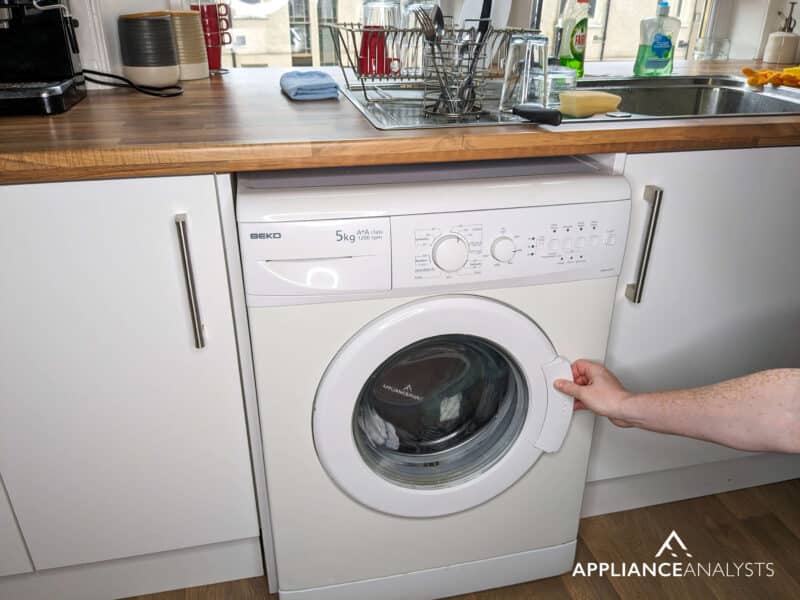
Top-load and front-load washers come in various capacities, typically around 3.5 to 5.8 cubic feet. Depending on your household size and laundry needs, selecting a washer with a suitable capacity to handle your laundry loads effectively is essential.
#2 Price Comparison
Price is often a significant factor when considering the top-load vs. front-load washer debate. I find that top-load washers tend to be more affordable upfront.
Depending on the model, desired features, and capacity, you can find a decent top-load washer for around $400 to $1000. Front-load washers, on the other hand, are typically more expensive initially, as their starting price can be about $700, with high-end models quickly reaching $1,500 or more.
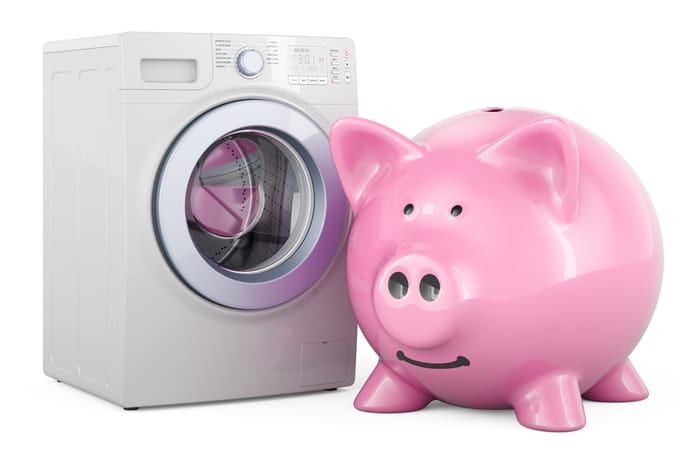
However, it’s also essential to consider the long-term costs, as front-load washers can be more energy and water-efficient, saving you money on utility bills over time.
Winner: Top load washer for upfront affordability.
#3 Efficiency
Now, let’s compare top load vs front load washers regarding efficiency.
In my experience, front-load washers use significantly less water and energy than their top-load counterparts, thanks to their unique design.
The efficiency of front-load washers can save you money on water and energy bills in the long run, making them a more cost-effective choice for eco-conscious homeowners.
Front-load washers tend to be more efficient than top-loaders. However, recent advancements in top-load washers, specifically those with impellers (also known as high-efficiency washers), have significantly narrowed the gap compared to older agitator-style top-load models.
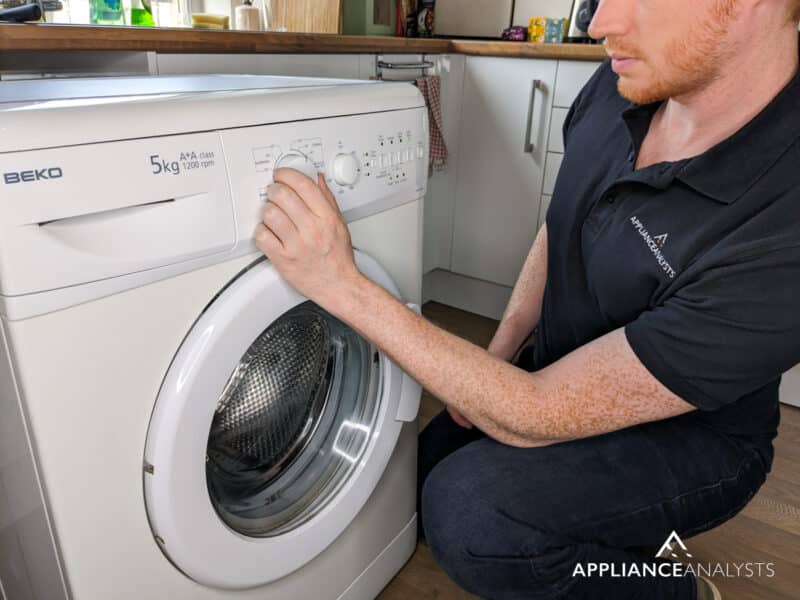
To better understand a washer’s efficiency, I suggest looking for the Energy Star rating, which indicates that the appliance uses at least 20% less energy and 30% less water than a non-certified standard model. Both front-load and top-load washers can earn the Energy Star certification.
Energy Star-certified front-load washers hold a slight advantage too. Certified front-load washers use approximately 45% less energy and 50% less water during operation than standard top-load agitator washers.
While high-efficiency top-load washers with impellers are more efficient than their agitator-style counterparts, they still lag behind Energy Star-certified front-load washers in efficiency by about 25%.
It’s also worth considering each machine type’s spin speed. For example, front-load washers typically have faster spin cycles that extract more water from laundry, leading to quicker drying times and reduced energy consumption.
So, when shopping for a new washer, consider that a washer with a lower upfront cost can be more expensive in the long run when factoring in electricity and water expenses.
Winner: Front load washer for energy and water efficiency.
#4 Cleaning Performance
When comparing top load vs front load washers, it’s also important to consider their cleaning performance.
In my experience, front-load washers generally outshine top-load washers because their tumbling action removes dirt and stains from clothes more effectively than the agitator or impeller action found in top-load machines.
You see, front loaders have impellers that rotate and tumble laundry loads. Their drum paddles lift and submerge clothes in and out of the water, effectively removing dirt and stains.
Some modern top-loading washing machines also use an impeller, functioning similarly to front-loaders. However, other top-load models employ a center-post agitator with paddles that shuffle clothes around during the cycle, shaking the machine and stirring the water to cleanse and rinse garments.
Nonetheless, top-load washers have a trick up their sleeve that most front-loaders need: the ability to pre-soak laundry before washing.

Even if a top-load washer has no dedicated soak setting, users can fill the machine and unplug it for a few hours to let items soak. The pre-soak option can be available in front-loaders if the manufacturer has specifically designed the machine to include a soak setting.
Winner: Front load washer for superior cleaning performance.
#5 Gentleness on Clothes
In my opinion, both top-load and front-load washers have their pros and cons when it comes to treating your clothes gently.
Traditional top-load washers with agitators can be rougher on clothes, leading to more wear and tear. However, newer top-load washers with impellers (high-efficiency top-load washers) are designed to be more gentle on clothes, similar to front-load washers.
Front-load washers are generally considered gentler on clothes due to their tumbling action, which causes less friction between clothes and the washer drum. As a result, it can help preserve the life of your clothes and prevent them from stretching or becoming damaged.
Winner: It’s a tie. High-efficiency top-load washers and front-load washers are both gentle on clothes.
#6 Space and Installation
When choosing between a front load vs a top load washer, it’s also important to consider your laundry room’s space.
My usual advice for smaller laundry rooms or tight spaces is to get a front-load washer, which can get stacked with a compatible dryer, freeing up valuable floor space in your home.
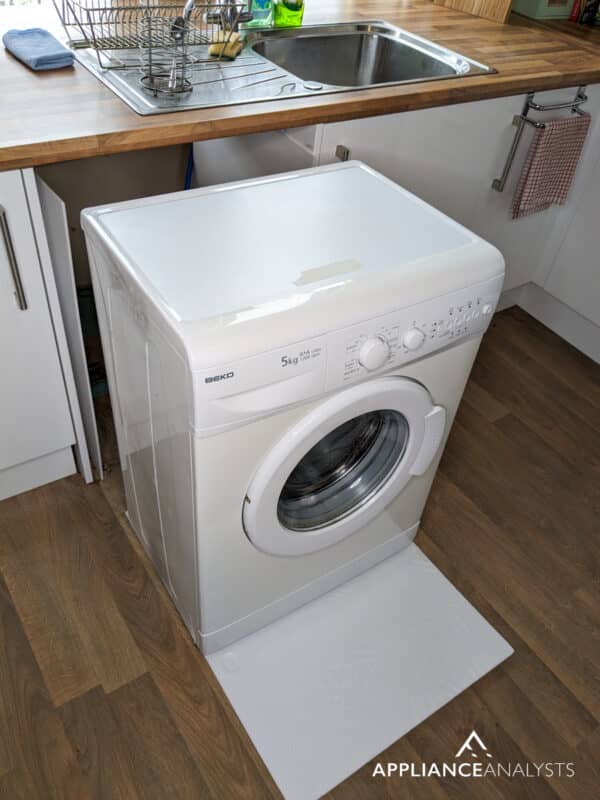
Due to their top-opening design, top-load washers cannot be stacked and generally require more vertical space. However, they usually have a smaller footprint, which can be helpful in narrow laundry rooms.
Regardless of whether you prefer a front-load or a top-load washer, I recommend checking the dimensions of your available space against the machine you’re considering, paying particular attention to the depth and door swings.
Additionally, front-load washing machines can be paired with ventless dryers, making them an excellent option for apartments or areas where venting to the outside is not feasible. Ventless dryers use condensation to drain water from the tub, eliminating the need to vent out hot, humid air.
Winner: Front-load washer for space-saving design and stacking capabilities.
#7 Noise Levels
Now, let’s compare front load vs top load washers in terms of the noise level.
Front load washers are generally quieter than top load washers, especially during the high-speed spin cycle. The horizontal drum design in front load washers helps to minimize noise and vibration.
However, keep in mind that front-load washers can still produce noise, particularly if not installed on a stable, level surface.
Top-load washers, particularly those with agitators, can be noisier due to the movement of the agitator during the wash cycle. High-efficiency top-load washers with impellers tend to be quieter but aren’t as quiet as front-load washers.
Winner: Front load washer for quieter operation.
#8 Maintenance
Both top-load and front-load washers require regular maintenance and cleaning to keep them in good working condition.
However, front-load washers are more prone to developing mold and mildew due to the presence of a door seal.
To prevent mold, it’s essential to regularly clean the machine, including the door gasket. Don’t forget to leave the washer door open between cycles to allow it to air out.
Keep in mind that the repair costs of front-load washers are typically higher, and they’re not as easy to work on yourself.
Top-load washers are less likely to develop mold and mildew issues and require less maintenance. However, they still need regular cleaning to prevent the buildup of detergent residue and lint.
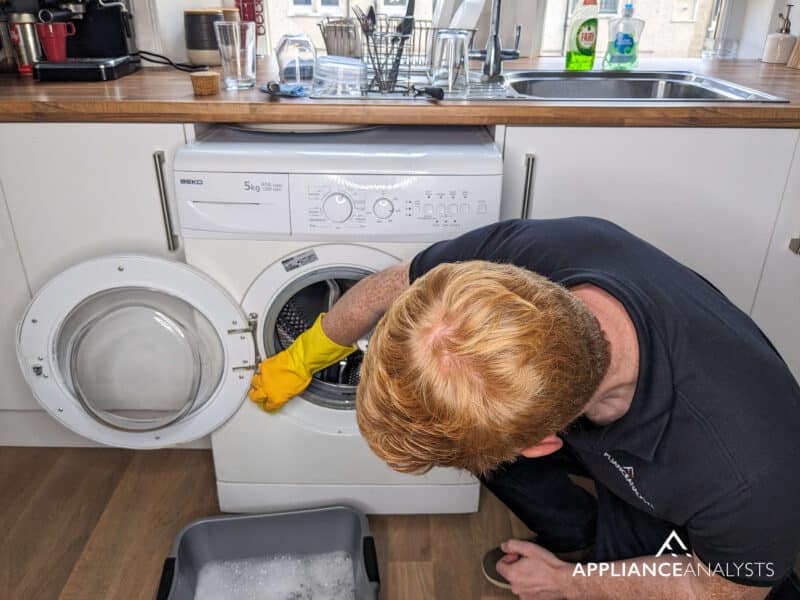
Winner: Top load washer for easier maintenance and cleaning.
#9 User-Friendliness
When comparing a top load vs a front load washer, I find the former is typically more user-friendly, with straightforward controls and easy access to the drum.
Front-load washers can be more technologically advanced, with digital displays, multiple cycle options, and sometimes even Wi-Fi connectivity. In my opinion, these features can be overwhelming for others who prefer a more straightforward washing experience.
Winner: Top-load washer for user-friendliness.
#10 Durability and Lifespan
Now, let’s compare for durability.
In my experience, if properly maintained and cared for, top-load and front-load washers can have long lifespans. However, front-load washers are generally more durable thanks to their more efficient design and use of high-quality components.
As a result, a front-load washer can easily last ten years or more with proper care and maintenance.
Top-load washers, especially those with agitators, can be more prone to wear and tear due to the constant movement of the agitator during the wash cycle. High-efficiency top-load washers with impellers can have a longer lifespan, but they are typically not as durable as a front-load washers.
Winner: Front-load washer for durability and lifespan.
#11 Child Safety
If you have young children at home, safety is probably a top priority when choosing between a front load vs a top load washing machine.
Front-load washers often come with built-in child safety locks, which can prevent curious little hands from opening the washer door during a cycle.
With their top-opening design, top-load washers can be more accessible to children, posing a potential safety risk.
While some top-load washers have safety features, they are not as common as front-load washers.
As a result, it’s essential to consider your family’s needs and take appropriate precautions to ensure the safety of your children around any washing machine.
Winner: Front-load washer for built-in child safety features.
#12 Resale Value
When choosing between a front load vs a top load washer, my usual advice is to consider the resale value, especially if you plan to sell your home.
Potential homebuyers often see front-load washers as more desirable due to their modern design, superior cleaning performance, and energy efficiency.
Top-load washers, while still popular among homeowners, can appeal differently to potential homebuyers, especially if they are older models with agitators.
Winner: Front load washer for potential resale value.
Wrapping Up: Top Load vs Front Load Washers
Hopefully, now you know the main differences between front load vs top load washers.
Here’s a quick summary of everything we’ve discussed so far:
| Choose a top-load washer if: | Choose a front-load washer if: |
| You’re looking for a more budget-friendly option. | You value superior cleaning performance and efficiency to save money on the long run. |
| You prefer a user-friendly and convenient washing experience. | A sleek, modern design and appearance are important to you. |
| You want to be able to add clothes mid-cycle. | You need a washer that is more accessible for wheelchair users or those with mobility issues. |
| You want a washer with a smaller footprint for narrow laundry rooms. | You have a smaller laundry room and want the option to stack your washer and dryer. |
Finally, the top vs. front load washer debate ultimately comes down to your preferences, needs, and budget. Both types of washers have advantages and drawbacks, and the best choice for you will depend on the factors most important to you.
Now, it’s time to start shopping. With this newfound knowledge, you can confidently navigate the world of washing machines and select the perfect washer for your home.
Thank you so much for reading! If you found this article helpful, please check out our other related guides below.
Good luck!







